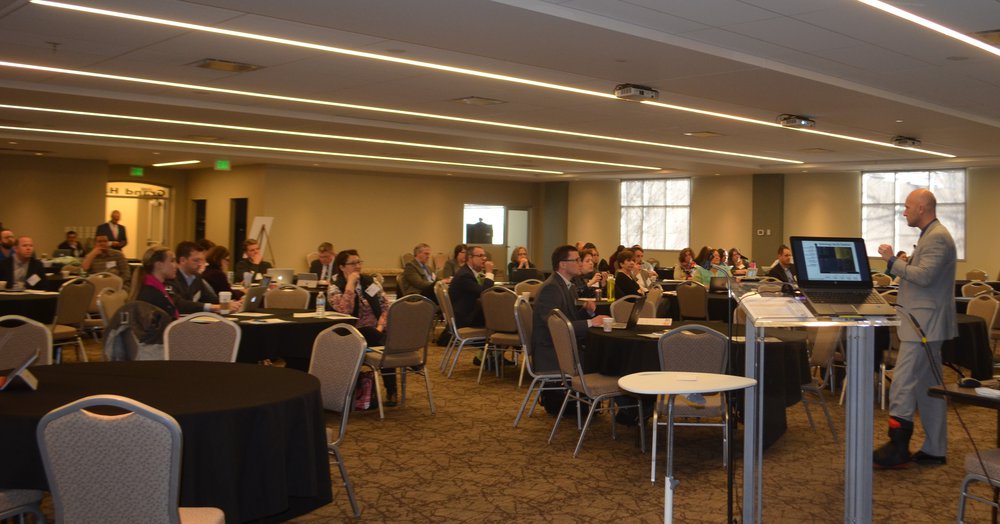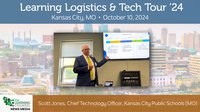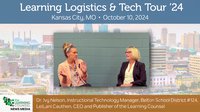It was an unusually warm and sunny day in Minneapolis as education leaders came from every corner of the state, even including Fargo from North Dakota and also from Michigan to collaborate and further develop a “best practices” approach to digital teaching and learning.
One thing the Learning Counsel heard during the day of discussion, like many areas in the Country who are trying to do online learning to support all their schools, they’re understaffed, the demand is really high, but, like most places, they’re really excited. They want to do fantastic things for the kids and they are seeing a difference everywhere they are able to make it work.
“During lunch I had the chance to sit down with Barb Meidinger, Principal of the North Dakota Center for Distance Education,” said LeiLani Cauthen, the Learning Counsel CEO. “Barb told me she had been following the work of the Learning Counsel for two years and made sure she arrived to the event to see what’s the latest in the industry.” Barb went on to tell LeiLani that finding people who really understand how to deliver teaching in an online-way – how you do that interaction – and finding the right software or building the right type of course so that’s absorbable by students today is not an easy thing. It’s a high art.
The Learning Counsel was able to deliver just what Barb needed with the 71 Characteristics, Special Report and the Definitions of Terms Workbook—only available at the Digital Curriculum Discussions.
Every educator who attended gained a new perspective of the national market scene through LeiLani’s market briefing and Dr. David Kafitz’ report on research and findings of digital transition across the U.S.
“What’s important about this event is that we get people on the same page,” stated Dr. Kafitz. “It’s an essential ingredient to actually having the conversation about how you move to Digital. If all 51 of your 51 instructors have a different definition of blended-learning that really is so general that it encompasses everything about technology and the mere idea of blending technology into all the existing structure of teaching and learning, it doesn’t do anything. It’s kind of the same thing as saying ‘I now have a mobile phone, I’m fully digital’, right? It’s like ‘Really?’ – it doesn’t DO anything for you.”
Photo Gallery of Minneapolis
The day also offered executives the chance and space to plan their strategy for change. One Superintendent who attended from Milaca Public Schools with his Director of Student Achievement gleaned everything they could from the presentations, the workbook and Special Report and then stayed late to use the table space, to write down a plan of what they were going to go back to their district and do with the information.
“One of the things that happened during our day in Minnesota—but we also see it in other cities—that was interesting,” LeiLani pointed out, “we talk about how you’re going to have a full Digital Curriculum Coverage Map and what that is going to look like. What it’s going to BE like to go through that process of actually selecting objects for three to five hundred Standards per grade. It’s not a small thing and as we talk about that, people get a little stunned. Minnesota was no different, they were a little stunned by the magnitude of the journey they’re on.”
Attendees took part in a digital curriculum objects selection process exercise which represented the work it takes to make important decisions during a transformation strategy. Teams were formed and had to collaborate and come to conclusions on goals and how to accomplish those goals while keeping to standards and agreed upon platforms, Microsoft, iOS, etc. Some tables did great while others didn’t even get all the way through the discussion on what goal they should have. This room full of leaders learned, just by the argument of having to go through selecting a goal before they can even select anything, that, as an organization, there’s a lot to worry about with how they even form a goal. In the end all realized the size of their task as well as ways to think about it and they had a good time with it.
In answering questions to the audience from the leadership panel towards the end of the day, Mr. Chad Maxa, the Executive Director of Technology & Innovation for Intermediate District 287 in Plymouth, MN., spoke to the ebb and flow that occurs regards student data privacy issues (another key subject during the day’s discussions). “We tighten down security and then over time lessen the grip on it based on what is happening in the classrooms so that teachers and students can get the apps and other learning tools they need and want. But we retool the teacher training and filtering on this subject on an annual basis. I wish I could say we have it all shored-up, but I would be lying.”
As the day closed out, LeiLani shared how Minnesota, her home state, stood out as a fantastic group of educators who were pushing for change and growth. The Learning Counsel looks forward to seeing our friends in the northern states again soon and hearing about your successes.











